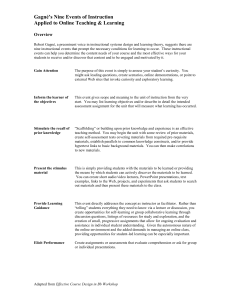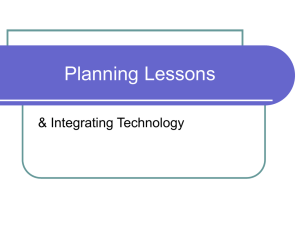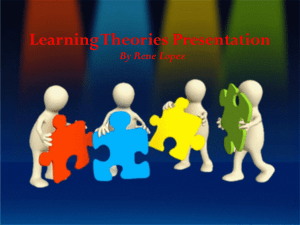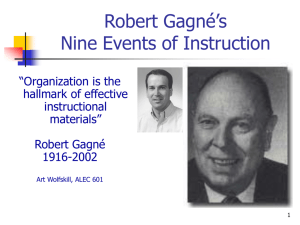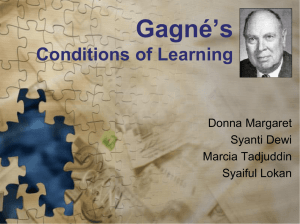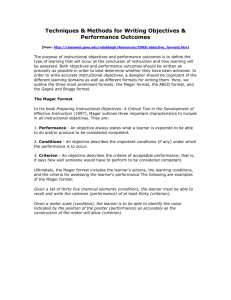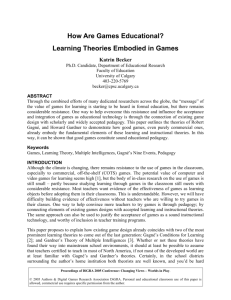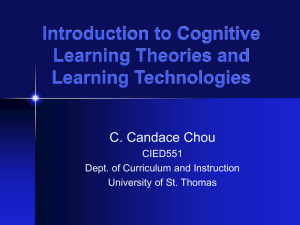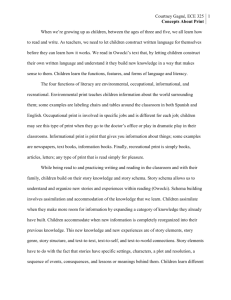Gagné's Conditions of Learning
advertisement
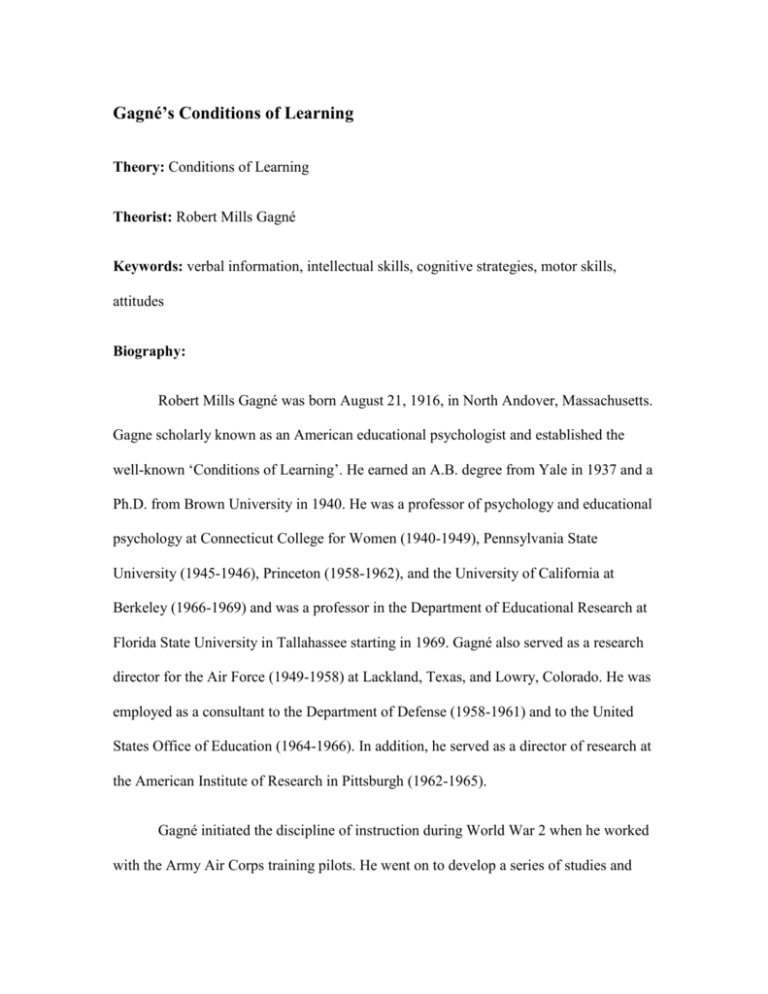
Gagné’s Conditions of Learning Theory: Conditions of Learning Theorist: Robert Mills Gagné Keywords: verbal information, intellectual skills, cognitive strategies, motor skills, attitudes Biography: Robert Mills Gagné was born August 21, 1916, in North Andover, Massachusetts. Gagne scholarly known as an American educational psychologist and established the well-known ‘Conditions of Learning’. He earned an A.B. degree from Yale in 1937 and a Ph.D. from Brown University in 1940. He was a professor of psychology and educational psychology at Connecticut College for Women (1940-1949), Pennsylvania State University (1945-1946), Princeton (1958-1962), and the University of California at Berkeley (1966-1969) and was a professor in the Department of Educational Research at Florida State University in Tallahassee starting in 1969. Gagné also served as a research director for the Air Force (1949-1958) at Lackland, Texas, and Lowry, Colorado. He was employed as a consultant to the Department of Defense (1958-1961) and to the United States Office of Education (1964-1966). In addition, he served as a director of research at the American Institute of Research in Pittsburgh (1962-1965). Gagné initiated the discipline of instruction during World War 2 when he worked with the Army Air Corps training pilots. He went on to develop a series of studies and works that simplified and explained what he and others believed to be 'good instruction’ (Johnson, 2008). Gagné was also interested in designing computer-based training and multimedia based learning by inserting learning instruction element. Gagné's work is sometimes summarized as the Gagné Assumption. The assumption is that different types of learning exist, and that different instructional conditions are most likely to bring about these different types of learning (Johnson, 2008). Gagné passed away on, April 28, 2002, in Signal Mountain, Tennessee. Description of Theory: Gagne’s The Conditions of Learning was published in 1965 is a prominent theory on relating environment as the main factor that affects the learning instructions. The effectiveness of learning is fundamentally rely on events in the environment with which learners feedback is important to be measured more closely and reflect understanding on what the teaching contents. Gagne (1985) portrayed that “[l]earning is not simply an event that happens naturally; it is also an event that happens under certain observable conditions” (pg. 2). These conditions as mentioned can be effectively controlled by using certain methodologies and be altered depending on the learning conditions in order to gain meaningful learning outcomes (Gagne, 1985). EVENTS OF LEARNING CONDITIONS OF LEARNING LEARNING OUTCOMES (CAPABILITIES) Figure 1. The relations between events of learning, outcomes of learning, and conditions of learning by Gagné, 1985, p. 18. Gagné’s condition of learning stipulates that levels and types of learning can be existed by numerous of way. The classifications made by Gagné come with different types of instruction that made this theory significantly with teaching and learning practices. Generally, instruction in a key to promote learning and conditions of learning play a significant role to attain learning objectives. Gagné (1985) agreed that “the external situation needs to be arranged to activate, support, and maintain the internal processing that constitutes each learning event” (pg. 20). Gagné identifies five major categories of learning: verbal information, intellectual skills, cognitive strategies, motor skills and attitudes. Different internal and external conditions are necessary for each type of learning. For example, for cognitive strategies to be learned, there must be an option to practice developing new solutions to problems; to learn attitudes, the learner must be exposed to a reliable role model or credible arguments (Culatta, 2012). While Gagné’s theoretical framework covers all aspects of learning, the focus of the theory is on intellectual skills. The theory has been applied to the design of instruction in all domains (Gagné & Driscoll, 1988). Gagne suggests that learning tasks for intellectual skills can be organized in a hierarchy according to complexity: stimulus recognition, response generation, procedure following, use of terminology, discriminations, concept formation, rule application, and problem solving (Gagné, 1985). The major significance of the hierarchy is to identify fundamentals that should be completed to facilitate learning at each level. Prerequisites are identified by doing a task analysis of learning and training task. Learning hierarchies provide a basis for the sequencing of instruction. Briefly, the theory outlines nine instructional events and corresponding cognitive processes:(1) gaining attention (reception) (2) informing learners of the objective (expectancy) (3) stimulating recall of prior learning (retrieval) (4) presenting the stimulus (selective perception) (5) providing learning guidance (semantic encoding) (6) eliciting performance (responding) (7) providing feedback (reinforcement) (8) assessing performance (retrieval), and (9) enhancing retention and transfer (generalization). These events should satisfy or provide the necessary conditions for learning and serve as the basis for designing instruction and selecting appropriate media (Gagné, Briggs & Wager, 1992). The following example illustrates a teaching sequence corresponding to the nine instructional events for the objective; recognize an equilateral triangle (Culatta, 2012): 1. Gain attention - show variety of computer generated triangles 2. Identify objective - pose question: "What is an equilateral triangle?" 3. Recall prior learning - review definitions of triangles 4. Present stimulus - give definition of equilateral triangle 5. Guide learning- show example of how to create equilateral 6. Elicit performance - ask students to create 5 different examples 7. Provide feedback - check all examples as correct/incorrect 8. Assess performance- provide scores and remediation 9. Enhance retention/transfer - show pictures of objects and ask students to identify equilaterals Learning does not occur unless the learner is receptive to incoming information. In order for learning to take place, the instructor must initially capture the attention of the students. Usually, gaining attention is accomplished by a stimulus change (Driscoll 1994). An understanding of pedagogical theory can increase the effectiveness of bibliographic instruction. Theory Measurement and Instrumentation: The Conditions of Learning is modified, extended, and used to form a logical model applicable to planning and teaching the social studies. It is used to develop planning procedures and to sequence instructional activities consistent with attaining complex levels of student learning (Gredler, 1997). Sample activities are provided for each of the five levels of learning: verbal association, discrimination learning, concept learning, rule learning, and problem solving. Each sample activity contains eight component parts including (1) focus, (2) learning objectives, (3) instructional set, (4) student directions, (5) student activities, (6) format of answer or decision sheet, (7) activity follow-up question, and (8) transfer readiness data. A similar model can be used as a basis for creating pre-objectives and test-items at each level. Social studies teachers and supervisors from three Florida counties found the modified Gagné model to be a useful construct for teachers who desire ways of teaching concepts and problem solving skills in intermediate and secondary social studies classrooms (Driscoll, 1994). Prepared by: Muhd K. Omar References: Calutta, R. (2012, November 3). Conditions of learning (Robert Gagne) [Web log comment). Retrieved from http://www.instructionaldesign.org/theories/conditions-learning.html Driscoll, M. P. (1994). Psychology of learning for instruction. Boston: Allyn & Bacon. Gagné, R. M. (1985). The conditions of learning and theory of instruction (4th Edition). New York, NY: CBS College. Gagné, R. M., Briggs, L. J., & Wager, W. W. (1992). Principle of instructional design (4th Edition). Orlando, FL: Harcourt Brace Jovanovich College. Gagné, R.M., & Driscoll, M. (1988). Essentials of Learning for Instruction (2nd Edition). Englewood Cliffs, NJ: Prentice-Hall. Gredler, M. E. (1997). Learning and instruction: Theory into practice. Upper Saddle River, NJ: Prentice-Hall, Inc. Johnson, W. G. (2008). Robert Gagne's educational theory and bibliographic instruction. Community & Junior College Libraries, 14(3), 211-222. doi:10.1080/02763910802035173
